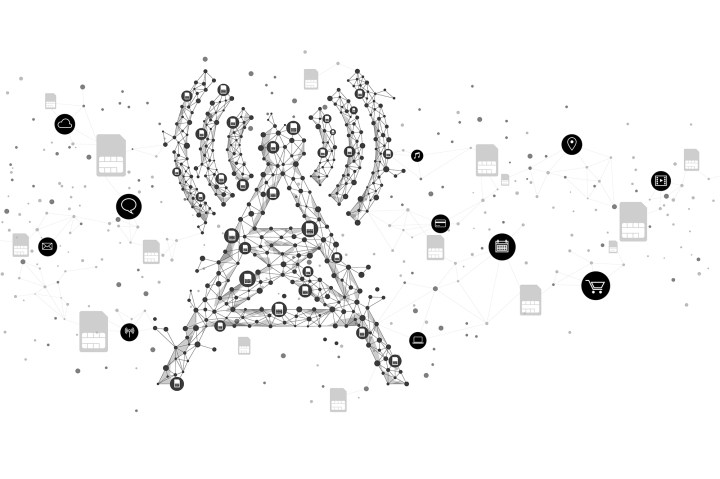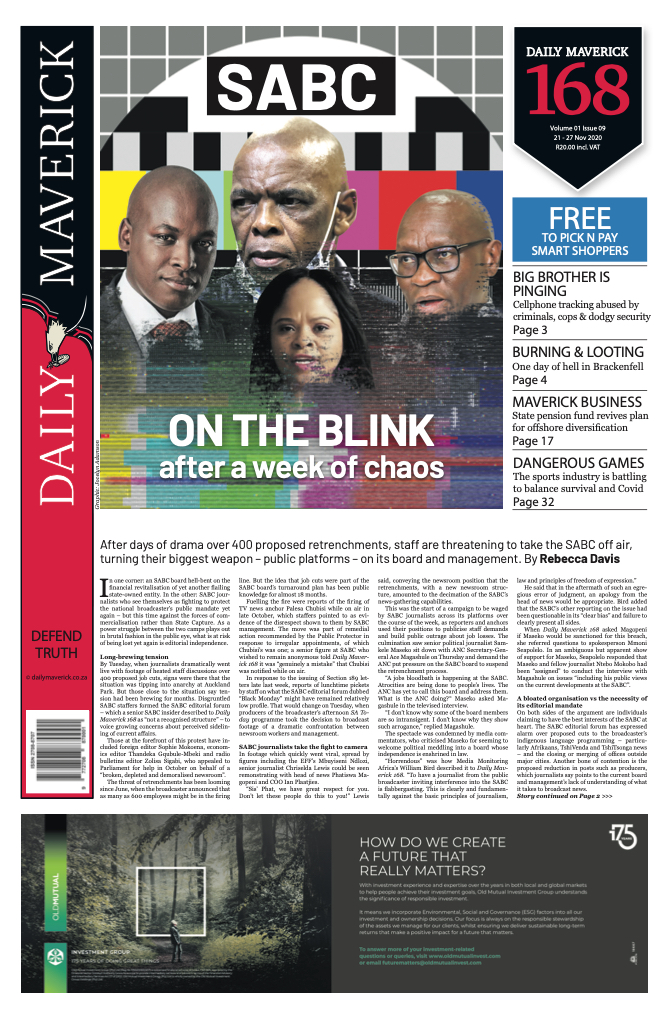DM168
Hide and seek: into the murky world of cellphone tracking

Millions of people are exposed to being tracked by dodgy private investigators, jealous or abusive spouses and shady criminals through the illegal pinging of cellphones by the private sector and the police.
First published in Daily Maverick 168.
Many South Africans may have been stripped of privacy and made vulnerable to criminals due to the abuse of cellphone tracking among some individuals meant to be protecting them – including police and private investigators – who have instead used these methods for dubious reasons.
On top of this, sources with ties to police and private security say that the poorly regulated cellphone tracking arena is bolstered by the clandestine trade of personal information, gleaned from banks, government agencies and sometimes neighbourhood organisations that use technology including licence plate recognition cameras.
This all enriches crooks with details that enable them to predict the movements of, or trace, targets with ease.
Sources said cellphone pinging alone, as well as the festering problem of amalgamated information leaks, amount to a major threat to national security.
State Security Agency spokesperson Mava Scott said only people authorised in terms of the Regulation of Interception of Communications and Provision of Communication-Related Information Act (Rica) could lawfully ping cellphones using GPS location.
“Any ping that is utilised without such authorisation … is a criminal offence,” he said.
“It infringes the right to privacy of an individual and can, as we have seen in recent murders, endanger lives or result in a loss of life through organised crime activities that threaten national security.”
There was widespread concern that there were individuals purporting to be legitimate private investigators, as well as officially registered investigators, who did illegal pinging.
According to the Private Security Industry Regulatory Authority (PSIRA), South Africa has 591 registered private investigators – of these, 253 are actively working.
Daily Maverick 168 posed a set of questions about pinging to PSIRA, which referred questions to national police, which advised that the questions were forwarded to crime intelligence but were unlikely to be responded to and that the SSA should instead be approached.
The SSA said further questions about pinging would possibly be best posed to the Justice Department, which was not able to respond by deadline.
This week, the office of Inspector-General of Intelligence Setlhomamaru Dintwe was also not able to comment.
Pinging was thrust into the spotlight following the assassination of Lieutenant-Colonel Charl Kinnear on 18 September outside his Bishop Lavis home in Cape Town.
It subsequently emerged that former rugby player Zane Kilean, charged in connection with the assassination, had pinged several cellphones of figures in legal and underworld circles more than 10,000 times over half a year.
Kinnear’s phone was apparently pinged 2,116 times in the months leading up to his assassination.
Interestingly, his murderer was reportedly in the area for six hours before the shooting and had he simply known where Kinnear lived, would not have had to rely on cellphone pings to track the cop.
It is not yet clear if the gunman was in any way linked to cellphone pinging.
Pinging is effectively tracking a cellphone via the co-ordinates of cellphone towers it connects with and based on this, deducing roughly where the phone is.
It does not mean precise pinpointing of a cellphone and instead provides a location within a radius ranging anywhere from between 30m (or less) to 10km, based on the area the cellphone is in.
GPS technology can also be used to track a cellphone. A source within the private security sector said it was common knowledge that virtually “everyone” either had access to pinging or knew individuals who did.
Access to pinging software, which is meant to be strictly regulated, can be purchased if certain criteria are met and the buyer can further purchase a bundle of pings.
But even if someone had legitimate access to a pinging platform, they could forward their login details to others, giving them access too.
“We know of investigators who have been given/or bought login credentials to test accounts or are fraudulently using the login details of large corporations who wouldn’t notice a few extra pings on their account,” said another source within the industry.
“Some investigators are without scruples and will think nothing of offering these services for any reason.”
A breach could occur at several points along the pinging chain – a person with direct access to, or running, a pinging platform may use it for dubious reasons or sell pings to unscrupulous individuals, and ineffective oversight from mobile operators could result in location-based service (LBS) abuse.
Chad Thomas, a registered private investigator and director of IRS Forensic Investigations, explained that LBSs were used to ping cellphones.
“Several platforms were made available to the state, to private organisations (for example vehicle tracking companies, private investigation companies, drug rehabilitation centres, etc), to non-profit organisations, and to community groups to make use of LBS,” he said.
Access to these services was provided to tackle crime.
Thomas said bolstered regulations were needed to prevent LBS abuse.
“There are grey areas in terms of legislation that have been improperly used by persons or groups with a nefarious agenda,” he said.
“Anything that can be used for surveillance and counter-surveillance which is unchecked or unregulated can pose a threat to national security.”
Another source within the private security sector told Daily Maverick 168 it was easiest to ping cellphones via the mobile networks MTN and Vodacom.
This was likely because the other major network, Cell C, did not offer a commercial LBS via Wireless Application Service Providers (WASPs).
Cellphone tracking has apparently been used for nefarious reasons for more than two decades. In early 2013, an underworld suspect with ties to private security explained that some of his associates, as part of their work in private investigations, triangulated cellphones – a method in which multiple cellphone towers are used – to trace people when necessary.
Three sources with links to private security said police needed to apply to a service provider to have a cellphone pinged, but some who wanted to override official processes often turned to private individuals offering this service.
One of the sources said there were also some private investigators so eager to solve cases and outdo rival investigators, and thus pull in more clients, that they opted to ping cellphones to achieve this.
But some of these investigators also pinged for criminals and were privy to information that police needed.
“You’ve got these Robin Hoods who ping to solve cases, they also work with criminals and are then taken on to police books as informants,” the source said, emphasising that this arena was a knotted mass of legal and illegal information peddling.
MTN spokesperson Jacqui O’Sullivan detailed the red tape police officers had to cut through if they wanted to ping a cellphone.
She said police had to follow a process as detailed in Rica legislation.
All police requests, she said, were managed by crime intelligence’s head office.
MTN had, up until October, contracted nine service providers that were authorised to offer certain location-based services, including security-related services and alerts, and vehicle tracking.
“On receiving information from the SAPS, that claimed abuse of the location-based services being offered by those companies contracted to MTN, MTN immediately shut down all access to those contracted companies,” O’Sullivan said.
“The allegations are that the required strict adherence to the contractual requirements, that individual permissions must be in place prior to tracking a number, may have been ignored by the companies offering the LBS facilities.”
A forensic investigation into the possible abuse of LBSs was under way.
Meanwhile, a Vodacom spokesperson said WASPs that provided LBSs were audited internally and externally and that “historic independent audits” had not identified “any instances of outright abuse”.
“When Vodacom was informed of the possible illegal tracing by SAPS, we established that there appeared to be excessive tracing of a specific MSISDN (Mobile Station International Subscriber Directory Number),” the spokesperson said.
The LBS provider was suspended and Vodacom “commissioned an independent audit report on whether the location information of the MSISDN was provided illegally to a third party”.
Data privacy expert Murray Hunter pointed to mobile networks as slipping up.
“Essentially, [they] have been renting out their customers’ most sensitive information without consent or any evidence of due diligence. It’s not even clear how they have justified it legally,” he said.
“It has left millions of South Africans exposed to being tracked by dodgy private investigators, jealous or abusive spouses, and of course shady criminals.”
Hunter called for an official investigating into the matter.
Ilonka Badenhorst, general manager at the Wireless Application Service Providers Association, said the mobile industry needed to work together “to tighten the governance of networks, service providers and employees in this space to prevent improper or illegal use thereof as far as possible – as well as clamp down on rogue providers”.
“For us this means evolving the monitoring of providers continually – as new threats become evident.” A source, who asked not to be named for safety reasons, said cellphone pinging was just a piece of an intricate puzzle of dodgy information gathering.
The source claimed there was a massive network in Johannesburg involving figures who pinged cellphones, connected to others who could access peoples’ banking and property details, as well as vehicle and traffic-related information.
These figures appeared to have contacts at government agencies.
“You can find out where people buy food, you can get their Markham account, find their dentist and even which ATM they last used,” the source said.
Cellphone tracking has apparently been used for nefarious reasons for more than two decades. In early 2013, an underworld suspect with ties to private security explained that some of his associates, as part of their work in private investigations, triangulated cellphones – a method in which multiple cellphone towers are used – to trace people when necessary.
Another source told Daily Maverick 168 it was widely believed that police Captain Bennie Lategan, who had been investigating exceptionally high-profile crimes and who was assassinated at an intersection in Cape Town in January 1999, had been tracked via pinging. It was suspected this had also been the case with other cops.
“What we found is, with the precision of the intercepts [ambushes], we concluded the only way these guys would’ve known where they were was via pinging,” the source said. DM168
You can get your copy of DM168 at these Pick n Pay stores.






















 Become an Insider
Become an Insider
There is no grey area – according to RICA, the subscriber must give consent. This must be explicitly given – such as signing up for a tracking service.
My first question would be to ask why there is no accountability with the service providers to prevent this sort of ping 😉